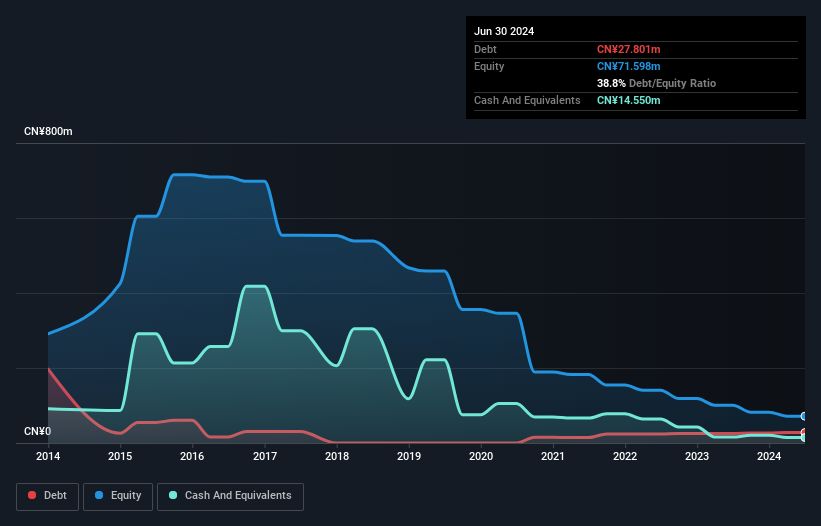
The external fund manager backed by Berkshire Hathaway's Charlie Munger, Li Lu, makes no bones about it when he says 'The biggest investment risk is not the volatility of prices, but whether you will suffer a permanent loss of capital.' When we think about how risky a company is, we always like to look at its use of debt, since debt overload can lead to ruin. Importantly, Luxxu Group Limited (HKG:1327) does carry debt. But the more important question is: how much risk is that debt creating?
When Is Debt Dangerous?
Debt is a tool to help businesses grow, but if a business is incapable of paying off its lenders, then it exists at their mercy. Part and parcel of capitalism is the process of 'creative destruction' where failed businesses are mercilessly liquidated by their bankers. While that is not too common, we often do see indebted companies permanently diluting shareholders because lenders force them to raise capital at a distressed price. Of course, debt can be an important tool in businesses, particularly capital heavy businesses. When we think about a company's use of debt, we first look at cash and debt together.
See our latest analysis for Luxxu Group
What Is Luxxu Group's Net Debt?
You can click the graphic below for the historical numbers, but it shows that as of June 2024 Luxxu Group had CN¥27.8m of debt, an increase on CN¥25.3m, over one year. However, it does have CN¥14.6m in cash offsetting this, leading to net debt of about CN¥13.3m.

How Strong Is Luxxu Group's Balance Sheet?
The latest balance sheet data shows that Luxxu Group had liabilities of CN¥8.58m due within a year, and liabilities of CN¥21.9m falling due after that. Offsetting this, it had CN¥14.6m in cash and CN¥20.5m in receivables that were due within 12 months. So it actually has CN¥4.59m more liquid assets than total liabilities.
This excess liquidity suggests that Luxxu Group is taking a careful approach to debt. Because it has plenty of assets, it is unlikely to have trouble with its lenders. When analysing debt levels, the balance sheet is the obvious place to start. But you can't view debt in total isolation; since Luxxu Group will need earnings to service that debt. So if you're keen to discover more about its earnings, it might be worth checking out this graph of its long term earnings trend.
Over 12 months, Luxxu Group made a loss at the EBIT level, and saw its revenue drop to CN¥26m, which is a fall of 31%. To be frank that doesn't bode well.
Caveat Emptor
While Luxxu Group's falling revenue is about as heartwarming as a wet blanket, arguably its earnings before interest and tax (EBIT) loss is even less appealing. Its EBIT loss was a whopping CN¥28m. Looking on the brighter side, the business has adequate liquid assets, which give it time to grow and develop before its debt becomes a near-term issue. But a profit would do more to inspire us to research the business more closely. This one is a bit too risky for our liking. The balance sheet is clearly the area to focus on when you are analysing debt. But ultimately, every company can contain risks that exist outside of the balance sheet. For example Luxxu Group has 3 warning signs (and 2 which are a bit concerning) we think you should know about.
At the end of the day, it's often better to focus on companies that are free from net debt. You can access our special list of such companies (all with a track record of profit growth). It's free.
New: AI Stock Screener & Alerts
Our new AI Stock Screener scans the market every day to uncover opportunities.
• Dividend Powerhouses (3%+ Yield)
• Undervalued Small Caps with Insider Buying
• High growth Tech and AI Companies
Or build your own from over 50 metrics.
Have feedback on this article? Concerned about the content? Get in touch with us directly. Alternatively, email editorial-team (at) simplywallst.com.
This article by Simply Wall St is general in nature. We provide commentary based on historical data and analyst forecasts only using an unbiased methodology and our articles are not intended to be financial advice. It does not constitute a recommendation to buy or sell any stock, and does not take account of your objectives, or your financial situation. We aim to bring you long-term focused analysis driven by fundamental data. Note that our analysis may not factor in the latest price-sensitive company announcements or qualitative material. Simply Wall St has no position in any stocks mentioned.
About SEHK:1327
Luxxu Group
An investment holding company, manufactures, trades in, retails, and sells watches and jewelries in the People’s Republic of China and Hong Kong.
Excellent balance sheet low.

